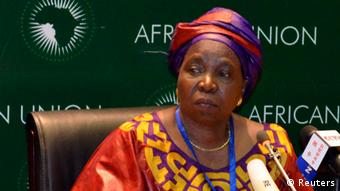The African Union is turning 50. It was established as an organization to fight for African unity and initially fought against colonialism. Today it seeks African solutions for African problems.
An African continental union which is economically strong and politically autonomous - that was the vision Kwame Nkrumah had back in 1958, just one year after he had led the British colony of the "Gold Coast" - today's Ghana - to independence. Now, as the country's president, Nkrumah invited other African heads of state to a summit. Only eight countries were able to respond. The rest were still struggling to free themselve from colonial rule.
Africa shakes off its colonial chains
Five years later, on May 25th, 1963, Nkrumah had found people from all over Africa who believed in his vision.
Representatives from 30 states gathered in Ethiopia's capital Addis Ababa for the founding summit of the Organization of African Unity (OAU). The charismatic Ghanaian and "Father of Pan-Africanism" told the delegates that their positive response was "an open testimony to the undamagable and irresistible surge of the people for independence." He said that Africa was about to free itself from the yoke of colonialism. Nkrumah was well aware of the expectations of the African people from Cairo to the Cape. "A whole continent has given us the mandate to set the foundation for our unity at this conference," he said. At that time South Africa was still ruled by a racist white minority regime.
The doctrine of non-interference
The main doctrine of the OAU was its policy of non-interference in the affairs of sovereign states.
But it was this which became the organization's biggest burden. That became evident when the euphoric spirit of optimism of the late 1960s was replaced by military coups and civil wars - and Africa's leaders could only stand by and watch. Soon critics named their yearly summit in Addis Ababa the "Dictators' Club."
Former Ethiopian diplomat and author Mengitse Desta does not agree with the accusation that the OAU failed on every level. He insists that the OAU "had strong teeth," considering its main goal. "The primary objective at the time it was established was to liberate the entire African continent from colonial, racist and apartheid systems," says the AU expert.
The Iron Curtain fell in 1989 and a few years later South Africa celebrated the end of apartheid. Dr Mehari Maru from the Institute for Security Studies in Addis Ababa says that soon after that the old ways of thinking were no longer sufficient. "The end of apartheid and colonialism in Africa gave rise to discussions of what should be holding Pan-Africanism and what the new causes of Pan-Africanism are." Maru says a new institution was needed for the discussion on a new form of Pan-Africanism and that is why the African Union was born.
From OAU to AU - to the United States of Africa?
In 2002, right after the end of the Cold War, the AU officially took over from the OAU in a formal ceremony held in Durban, South Africa.
From then on, the organization began searching for a new reason to exist - and found it in economic integration and democratization, which was only proceeding slowly. It was Libya's revolutionary leader and self-proclaimed African "king of kings" Muammar Gadhafi, who came up with a new idea - namely to implement Kwame Nkrumah's vision of a "United States of Africa". His motives had, however, more to do with power politics than with philosophy.
Gadhafi's plan was to create a union with a single army, a common currency and trade and travel freedom, similar to the European Union. But this plan brought more division than unity. It split the states into two factions, with political heavyweight South Africa on the opposite side to Gadhafi.
Woman power from South Africa
The controversial election last year of Nkosazana Dlamini-Zuma, South Africa's interior minister, as the new head of the AU Commission revived past differences between member states.
However, she is the first woman to head the Commission and a reformer who immediately announced her aim of making the African Union more effective.
The crises in Mali and the Central African Republic, plus the setbacks faced by the AU mission in Somalia, AMISOM, are putting the Union's resolve to the test.
For Dr Mehari Maru from the Institute for Security Studies, Africa is today "more democratic than ten years ago when we had less democratically elected leadership." What needs to be achieved now is governance democracy, he says, adding that there's a lack of "accomodation of diversity which is the main cause of most of the political problems we see in Africa."
"African solutions for African problems" is the slogan today - with what success, the next 50 years will show. dw de





No comments:
Post a Comment